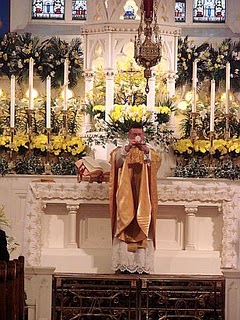(From left to right: Bro. Daniel Bowen, O. de M., Mr. Michael Bowes,
Serrin Foster, President of Feminists for Life, Bro. David M. Spencer, O. de M.)
Serrin Foster, President of Feminists for Life, Bro. David M. Spencer, O. de M.)
In recent days there has been a lot of news from across the country about measures, both on particular state levels and at the national level, concerning the area of life. The initiative of the House of Representatives to submit a move to defund Planned Parenthood of public funding. The General Assembly of VA has moved to require abortion mills to abide by the same standards as Hospitals across the Commonwealth -- a plan that will likely prove too expensive for these mills to remain operational. Last evening, 3 of the friars in Philadelphia and 1 postulant had the privilege of attending a banquet sponsored by the Pennsylvanians for Human Life, where the keynote speaker was Serrin Foster, President of the Feminists for Life. In what proved to be a remarkable talk, Serrin taught many of us facts and details of the Historic Womens' Movement that are simply lost or muted in our common learning experience of American History. Details which included the fact that from the very beginnings of the movement of Womens' Rights, the right to life was a hallmark of these foundresses. Today, this note in history is not even mentioned and is so muted that many, included us friars, have equated the Womens' Movement with pro-abortion positions and policies.
I invite you to check out the websites linked above.... and lend your prayers and support.












